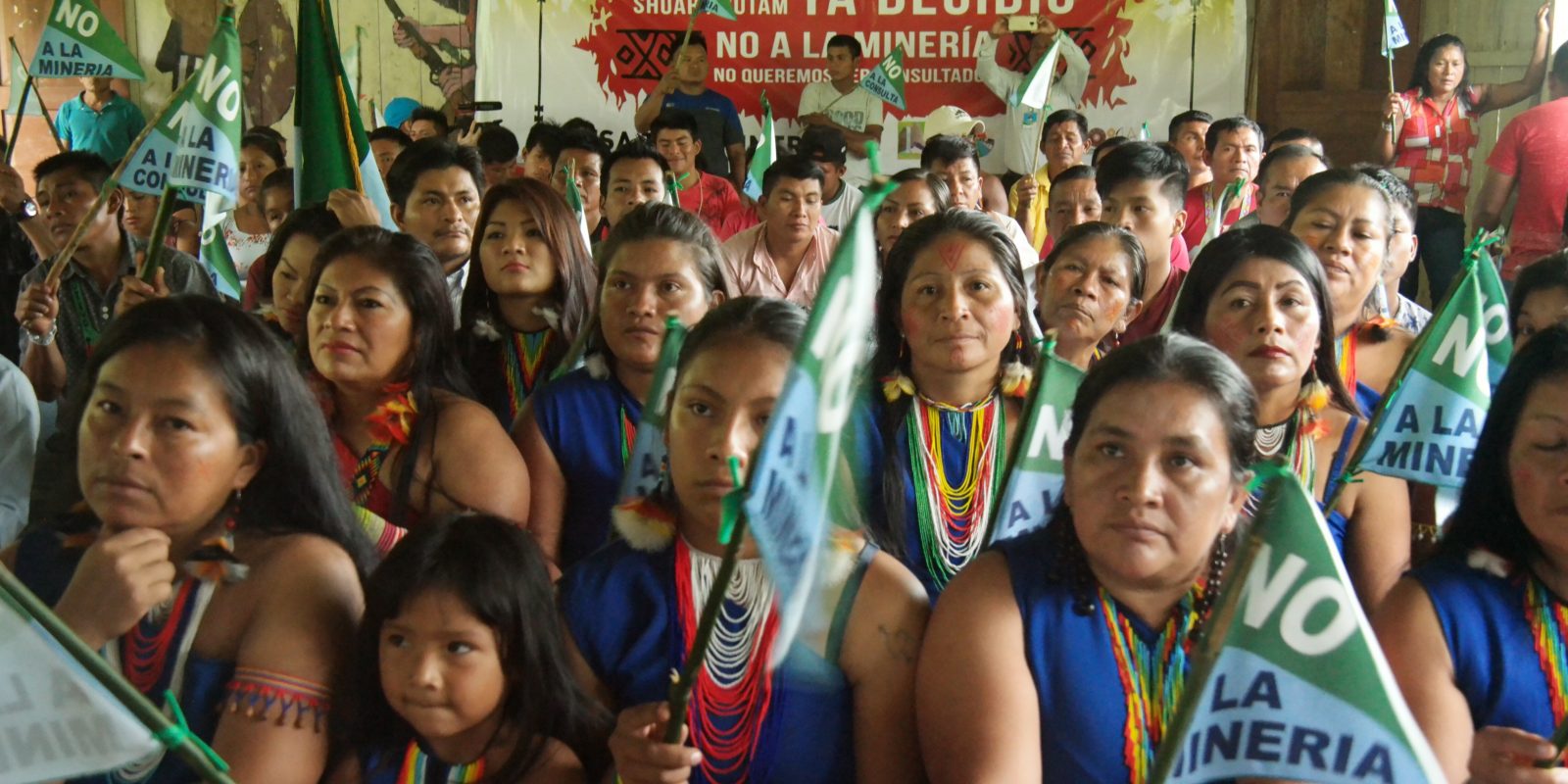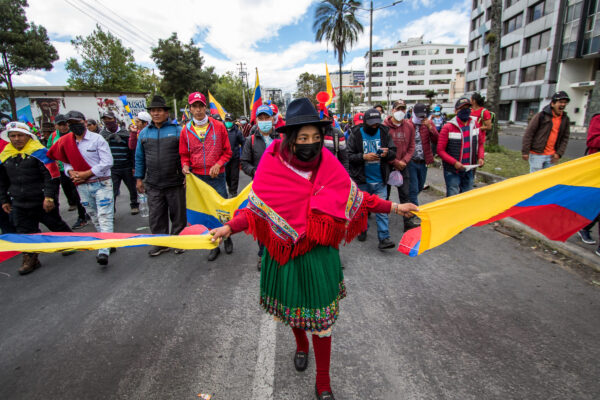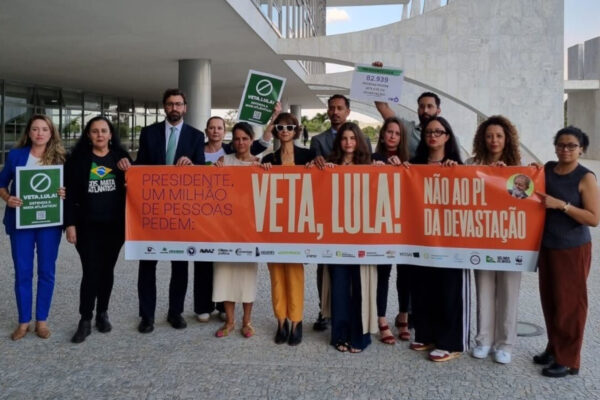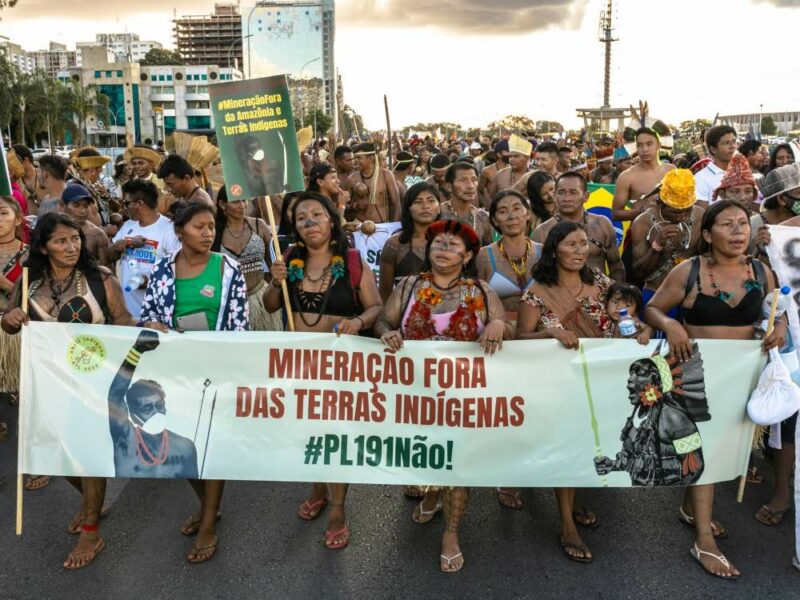Amazon Watch has worked in solidarity with the Shuar Arutam people in the defense and protection of their rights since 2016. That year, the Chinese mining company EXSA, was responsible for the forced eviction of the Nankits community to build a workers camp for the San Carlos-Panantza mine. We continue to document rights violations and threats to their territory and are supporting advocacy and legal action to make sure their rights and territories are respected. A growing coalition including Mining Watch, Witness, and others are stepping up in solidarity to echo the Shuar Arutam calls for the companies to leave and the Ecuadorian government to permanently cancel the concessions.
From the remote rainforest community of Maikiuants in southeastern Ecuador, Josefina Tunki told the world that the Shuar have already decided: no mining on their territories. In a virtual press conference last week, Tunki announced that her people will be filing a legal complaint against Ecuador before the International Labour Organization (ILO) for violations of the Indigenous and Tribal Peoples Convention 169 over an open-pit mining project that overlaps the titled territory of her people.
Josefina is Shuar and the first female president of the Shuar Arutam organization (PSHA), which represents some 10,000 people and 47 communities across almost 600,000 acres of tropical forest, one of the most unique ecosystems on the planet. Their territory is in the heart of the Cordillera del Condor – the Condor mountain range where the Andes and Amazon meet. Here, peaks give way to expanding valleys, rivers, and waterfalls, and cool highland air mixes with dense Amazon heat and humidity, creating one-of-a-kind conditions for extreme levels of biodiversity and endemic species. This is where the Shuar have thrived in their ancestral territories for centuries. But now their very way of life is threatened.
Buried beneath Shuar territory, deep in the mountains, lie gold and copper deposits that Ecuador’s government and a handful of mineral prospectors are hoping to extract. Currently, illegal concessions for large-scale mining projects have been granted on more than 56% of Shuar Arutam territory, divided between at least three so-called “strategic mining projects”: Panantza-San Carlos, the Lost Cities, and Warintza. They were handed out by the Ecuadorian government without the consent nor consultation of the Shuar peoples in violation of ILO 169 and other international standards like the UN Declaration on the Rights of Indigenous Peoples (UNDRIP).
But the Shuar Arutam aren’t asking to be consulted. They’ve already decided. They want the companies out, and the concessions canceled.
“We have all collectively voted,” said Tunki during the press conference, explaining their position as a people taken during their assembly of 47 communities. “We unanimously reject large-scale extractive mining companies in Shuar Arutam territory. The majority of our territory has been conceded to mining companies without our consent and against our collective rights, and our right to self-determination enshrined in the ILO convention. The Shuar Arutam People have decided. We say, ‘No to mining!’ The companies must withdraw now!”
Like open-pit mines around the world, gold and copper extraction has ravaged Ecuador’s unique Andean and Amazonian ecosystems, leading to deforestation, contamination, and biodiversity loss. They have also taken a huge toll on the health of local communities, threatening food security and clean water. Similar projects in other areas of Ecuador have led to violent conflict between communities, companies, and the military. But with Ecuador’s economy still reeling from the COVID-19 pandemic and collapse of oil prices, the country is doubling down on the extractive industry – and mining in particular – to pull it out of its worst financial crisis in modern times.
The Shuar Arutam are taking legal action over rights violations to the ILO because the Ecuadorian government has been unwilling to comply with the minimum requirements stipulated in its constitution, much less internationally recognized standards. The ILO Convention 169 was ratified by Ecuador in 1998 and is a binding agreement between Ecuador. Failure of Ecuador to properly enforce it can have repercussions and affect the country’s standing as it seeks international support and investment in its post-pandemic economic recovery plans.
The government is currently moving to draft legislation on the right of indigenous peoples to consultation, but it is doing so without even consulting them, and without guaranteeing their right to consent. Even if the Shuar Arutam aren’t interested in being consulted and have already decided that they do not want mining on their territory, they have an international right to FPIC. The country’s failure to conduct one renders the concessions and projects illegal.
Pressure has intensified on Josefina and the Shuar Arutam organization as the companies and government push to move the projects forward. Earlier this year, while dealing with the impacts of the COVID-19 pandemic, PSHA had to confront divide-and-conquer strategies and a disinformation campaign deployed by the Canadian mining company Solaris Resources, which holds the San Carlos-Panantza concession. In March, the company brought community members and falsely presented them as official PSHA representatives to Canada to attend the Prospectors and Developers Association of Canada 2020 (PDAC 2020), the world’s leading convention for exploration and mining of minerals. The company touted their appearance as approval for their project, although they were not elected leaders of the organization. To make matters worse, upon their return, they tested positive for COVID-19 and were responsible for a major outbreak in the region.
Solaris has continued to try to splinter the organization, by offering bribes to two of the 47 communities, which PSHA denounced in a letter to the company in September. Disturbingly, the Shuar Arutam reported intimidation by the Ecuadorian military and police who were en route to illegally enter their territory at the request of Solaris just two days before the press conference.
“The mining companies are dividing our organization,” said Tanki. “They are harassing the leaders of the PSHA who oppose mining projects. For this reason, we are exercising our right to self-determination. We have decided not to allow large-scale mining projects in our territory. We demand that the concessions that have been granted in our territory without our knowledge be canceled.”
The Shuar legal complaint to the ILO is an urgent call for justice, and it can set an important precedent for Indigenous peoples facing extractive projects on their territories over the lack of consultation, but also over the violation of their right to self-determination. But if Josefina and the Shuar Arutam are going to be successful in keeping their pristine territory from being turned into open-pit gold and copper mines, they need our solidarity!
For more information about the PSHA case and the campaign launched by the Shuar Arutam people, watch the documentary, “The Shuar People have already decided: No mining!” on Bombozila.














